英语语法之肯定句变否定句
英语肯定句改否定句口诀

英语肯定句改否定句口诀在英语语法中,人们经常需要将肯定句改为否定句,或者相反。
这是学习英语的一个重要部分,因为能够灵活运用肯定句和否定句的转换,可以使我们的表达更加丰富多样。
本文将为大家介绍一些英语肯定句改否定句的口诀,帮助我们更好地掌握这个技巧。
一、一般句式肯定改否定一般句式的肯定句改为否定句,只需要在动词前面加上"do not"或"does not"即可。
例如:He plays basketball every day.(他每天打篮球。
)→ He does not play basketball every day.(他不是每天打篮球。
)They eat lunch in the cafeteria.(他们在食堂吃午餐。
)→ They do not eat lunch in the cafeteria.(他们不是在食堂吃午餐。
)二、be动词肯定改否定be动词是英语中最常用的动词之一,其肯定形式为"is"、"am"、"are",改为否定形式只需在其后加上"not"即可。
例如:I am a teacher.(我是一名教师。
)→ I am not a teacher.(我不是一名教师。
)They are students.(他们是学生。
)→ They are not students.(他们不是学生。
)三、情态动词肯定改否定情态动词在英语中也占有重要地位,它们有自己的肯定形式和否定形式。
要将肯定形式转化为否定形式,只需在情态动词后面加上"not"即可。
例如:She can swim very well.(她会游泳得很好。
)→ She cannot swim very well.(她游泳不很好。
)You should listen to your parents.(你应该听父母的话。
改为否定句的方法
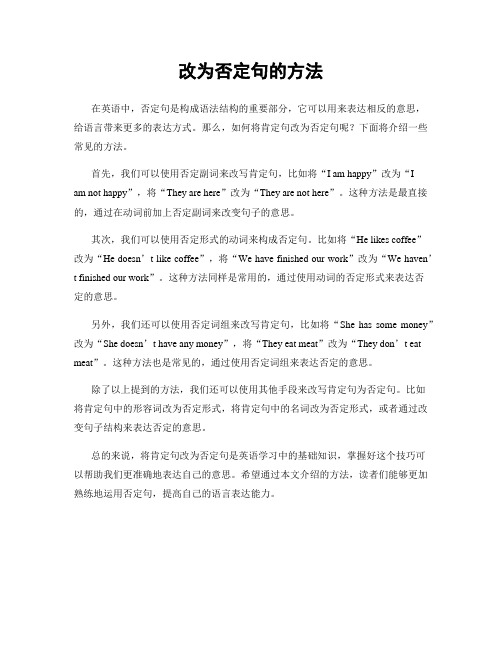
改为否定句的方法
在英语中,否定句是构成语法结构的重要部分,它可以用来表达相反的意思,
给语言带来更多的表达方式。
那么,如何将肯定句改为否定句呢?下面将介绍一些常见的方法。
首先,我们可以使用否定副词来改写肯定句,比如将“I am happy”改为“I
am not happy”,将“They are here”改为“They are not here”。
这种方法是最直接的,通过在动词前加上否定副词来改变句子的意思。
其次,我们可以使用否定形式的动词来构成否定句。
比如将“He likes coffee”
改为“He doesn’t like coffee”,将“We have finished our work”改为“We haven’t finished our work”。
这种方法同样是常用的,通过使用动词的否定形式来表达否
定的意思。
另外,我们还可以使用否定词组来改写肯定句,比如将“She has some money”改为“She doesn’t have any money”,将“They eat meat”改为“They don’t eat meat”。
这种方法也是常见的,通过使用否定词组来表达否定的意思。
除了以上提到的方法,我们还可以使用其他手段来改写肯定句为否定句。
比如
将肯定句中的形容词改为否定形式,将肯定句中的名词改为否定形式,或者通过改变句子结构来表达否定的意思。
总的来说,将肯定句改为否定句是英语学习中的基础知识,掌握好这个技巧可
以帮助我们更准确地表达自己的意思。
希望通过本文介绍的方法,读者们能够更加熟练地运用否定句,提高自己的语言表达能力。
英语四个基本时态的 肯定句变否定句

_M_r_s_.__L_i_a_n_d__K_i_t_t_y__a_r_e__n_o__t_i_n__a_b__ig__s_h_o_p__. ________ .
8. He is crying(哭) under the tree.
____H__e_i_s_n__o_t__c_r_y_i_n_g_(__哭__)___u_n_d_e_r__t_h_e__t_r_e_e__. _____ .
9. His birthday is on the twentieth of November.
The old man doesn’t do morning exercises(早操) every morning.
23. We are from China.
_________W___e__a_r__e_n__’t__f__r_o_m___C__h_i_n_a__.________ .
24. He goes to the library(图书馆) on Sundays.
_____H_e__d_o_e_s_n_’_t__g_o_t_o__th__e_l_ib_r_a_r_y__o_n_S_u_n_d_a_y_s_.____ .
25. They have a class meeting every week.
_T_h__e_y_d__o_n_’t__h_a_v_e__a__c_l_a_s_s_m__e_e_t_i_n_g__e_v_e_r_y__w__e_e_k_. .
英语肯定句变否定句的基本方法

英语肯定句变否定句的基本方法英语肯定句变否定句的基本方法【导语】英语语法让很多学生都头疼,因为复杂难懂的句式和词组有时难以记忆。
本章主要介绍英语语法中的句子成分,希望对同学们的英语语法学习有所帮助。
1. be动词的否定式be 动词根据不同的人称和时态有不同的形式,在一般现在时中是am , is , are可用作联系动词,构成否定式时,一律在其后面加否定词not.He is reading. --- He is not reading. They are from China. --- They are not from China.2. 情态动词的否定式情态动词的否定式是在其后面直接加not. 如:I can swim. --- I can’t swim. He can dance. --- He can’t dance. You should go to school at seven. --- You shouldn’t go to school at seven.3. 实义动词的否定句实义动词变否定句时,要借助助动词do , does,在一般现在时中用do或者does其句子结构为:主语+ don’t / doesn’t + 动词原形+其它例如:I like pop music. --- I don’t like pop music. He likes running. --- He doesn’t like running.She does her homework at home. --- She doesn’t do her homework at home初中英语句型分类知识点详解:一般否定句与特指否定句1. 一般否定句句型1[主语+特殊定式动词+not+行为动词或表语+其他]1. China of today is not what it was thirty years ago.2. "Isn't that Teddy Thomson out?"-"I think it's him, but I can'tbe a hundred percent sure."3. "Oh, sir, he can't have said such a thing! He can't have spoken like that to you, sir!"4. We must not wait for favors from Nature; we must take them from her.5. I haven't finished the book yet.6. Money could not buy happiness.[注1] He is no fool. Great barkers are no biters.[注2] 二十四个特殊定式动词:句型2[主语+do(does, did)+ not+行为动词+其他]1. Sorrow doesn't buy bread.2. Pure gold does not dread fire.3. "Why is Mr. Cooper so angry today?"-"I don't know why."4. "They did not steal so much."-"I don't care how much." He said, "… A thief is a thief."句型3[主语+ 行为动词+ no/not+宾语+其他]1. A rolling stone gathers no moss.2. Viola, hearing this, knew not how to behave, nor how to answer her.3. I know not what course others may take, but, as for me, give me liberty or give me death!4. We are fleet-winged men at arms; we fear not mountains high or rivers deep.句型4[There be+ no/not/not any+主语(+状语)]1. There was no well in the village at that time.2. Oliver Twist was born in a workhouse… There were no aunts, no sisters, no cousins, no grand mothers.3. There is not a moment to be lost.4. There is no holding back the wheel of history[附注] 一般否定句的其他表达方式:1. Who knows it? (=No one knows it.) Dare he do it? (=Hedare not do it.)2. God only knows! (=No one knows.) As if I would allow it! (= I would certainly not allow it.)3. Catch me doing that!4. If I do I am a villain. (=I will not do.) Do that again if you dare.5. In Heaven, an angel is nobody in particular. They shun personal fame and gains.6. The city and the areas around it are an ice-free port and a nuclear weapon-free zone. The building is in a state of neglect.7. She stood still, trying winly (in vain) to answer the battery of questions raised by the reporters.8. I dislike the idea very much. Mr. White has refrained from making any official comment on the coup in that country. Yesterday she failed to get to school on time. The evidence is conclusive, excluding all possibilities of doubt. They excluded children (from) getting in. We'll forever live up to what the party expects of us. Avoid operating the keys roughly. She was refused admittance by them.9. Slips are scarcely avoidable when you're new to your work. He is ignorant of conditions at the levels. Our PLA is worthy of being called a great army pf the people.10. The meetings were marked by such an absence of lively discussions that at times they were almost on the point of breaking up. Lei Feng's noble deeds are above all praise. To do this is beyond my ability. He is out of the office. (= He is not in the office.) Tom is away from Cambridge. (= Tom is not at Cambridge.) It is far from perfect. That served to strengthen instead of weaken our determination (or: That strengthened, rather than weakened, our determination.) The truth is quiteother than what you think. I know better than to quarrel.2. 特指否定句句型5[…not+非谓语成分…]1. Not a soul was anywhere visible.2. You must always remember not to become conceited.3. The teacher told his pupils not to make such a mistake again.4. I went to see him off, not to meet him.5. We felt sorry for not coming on time句型6[主语+否定式谓语+(宾语)+状语或从句(被否定部分)]1. I don't think it is right to make such hasty decision.2. I'm not feeling very well today.3. I don't believe that he will come tomorrow.4. You can't judge a thing only by its looks.5. He's studying English now, but he doesn't speak English very well yet.6. People did not shake off colonialist's yoke in order to put on hegemonist's yoke.7. Don't think ill of me because I use her help. She gives it cheerfully as you see…返回:初中英语句型分类知识点详解初中英语句型分类知识点详解:部分否定句与全体否定句部分否定句句型7[All, every等总括词…not+谓语动词…]1. All is not gold that glitters.2. All is not lost that is in peril.3. And yet all did not go smoothly between them, for the younger man…had his heart set on New York.4. I don't like both of the novels.5. Every one cannot make music.6. Everybody, it is true, wouldn't like it.7. Such a thing is notfound everywhere.8. The good and the beautiful do not always go together.9. A man of learning is not always a man of wisdom. 10. I don't wholly agree.[注] Some people like that sort of thing; Some don't.全体否定句句型8[no, none等否定词…+肯定式谓语+其他]1. Everybody talks about the weather, but nobody does anything about it.2. No trickery can fool us.3. None of my friends smoke.4. I could remember neither the name of the author nor the title of the book.5. Nothing in the world is difficult for one who sets his mind to it.6. The book was nowhere to be found.7. Neither of the sisters is here.8. Never have we been daunted by difficulties.句型9[主语+否定式谓语+不定代词或不定副词]1. I do not know any of them.2. I did not receive any letters yesterday.3. I don't like either of the novels.4. Justice must not be denied to anyone.5. Did you go any where yesterday?-No, I didn't go anywhere yesterday.6. Anyhow I shall not go today.[注] 不可说 "anybody cannot do it." 只能说 "nobody can do it."句型10[All等概括词+肯定式谓语+含否定意义的单词…]1. All germs are invisible to the naked eye.2. All his plans came to nothing.3. Both visitors are unwelcome.4. Every plan made by him is impossible of execution.5. We all disbelieve in the existence of God.6. Their quarrels are always interminable.返回:初中英语句型分类知识点详解初中英语句型分类知识点详解:延续否定句与半否定句延续否定句句型11[(前句)否定句,+(后句)否定句]1. "Oh, no, no, no and again no," said Pinocchio. "I must bea good boy."2. "Am I troubling you?"-"no, not in the least."3. I shall never do it, not under any circumstances.4. We must not think of him as a big, strong boy. Far from it!5. I don't know how much you've got, and I dare say you hardly know yourself, as it would take a pretty long time to count it.句型12[(前句) 主语+否定式谓语…,( 后句)not+ (同前)主语]1. I'll not do such a thing, not I.2. He will not break his word, not he.3. They will not be discouraged, not they.4. Tom cannot speak Russian, not he.句型13[(前句) 否定句,+ ( 后句)not/neither]1. Frieda didn't go to the dance, neither did Fanny.2. You can't do it, nor can anybody else.3. You did not see him, neither did I.4. Are you not going? Neither am I.5. Oliver did not come that day, nor the next day; nor the next after that, nor for many, many days after.6. I know not what, nor where, neither what latitude, what country, what nation, or what river. I neither saw, nor desired tosee any people; the principal thing I wanted was fresh water.[注1] 有时根据意义上的需要,下列句子是允许的。
肯定句变否定句

英语语法之肯定句变否定句一、肯定句变否定句口诀给句子分析它,看它结构是哪个主加be后加not 其他一切全照抄主加动词主重要don't doesn't 来帮忙don't doesn't 中间夹doesn't doesn't 最特殊第三人称单数全靠它二、简单句的句子结构1.主语+be+其他2.主语+动词+其他备注:其中be里包括(am is are)判断下列各句是主语加be还是主语加动词1.I am a girl.2.I like singing.3.We go to school every day.4.They are good friends.5.He works hard.6.She likes playing with toys.7.My mother watches TV every day.8.You are a beautiful girl.9.Tom is playing football on the playground.10.Bill does his homework after supper.三、肯定句变否定句规则肯定句主语+be+其他变成主语+be+not+其他主语+动词+其他变成主语+don't+动词+其他主语(第三人称单数)+动词单三+其他变成主语(第三人称单数)+doesn't +动词原形+其他练习1.She is watching TV now.2.We go to school on Sunday.3.His father works hard.4.Jack's mother is a nurse.5.The cat runs fast.6.They like reading books.7.My grandpa gives me a hot dog.8.Tom often walks to school.9.I have a doll.10.It is eating fish.肯定句变否定句的基本方法发布人:圣才学习网发布日期:2010-06-24 13:39 共人浏览[大] [中] [小] 【导读】一.动词be的否定式动词be根据不同的人称和时态可以有am, is, are, was, were 等不同形式,可用作连系动词(表示是、在等)和助动词(用于构成进行时态和被动语态等),但不管何种情况,构成否定式时,一律在其后加not: I’m old, but you’re young.一.动词be的否定式动词be根据不同的人称和时态可以有am, is, are, was, were等不同形式,可用作连系动词(表示“是”、“在”等)和助动词(用于构成进行时态和被动语态等),但不管何种情况,构成否定式时,一律在其后加not:I‘m old, but you’re young.我老了,但你还年轻。
英语肯定句变否定句的方法
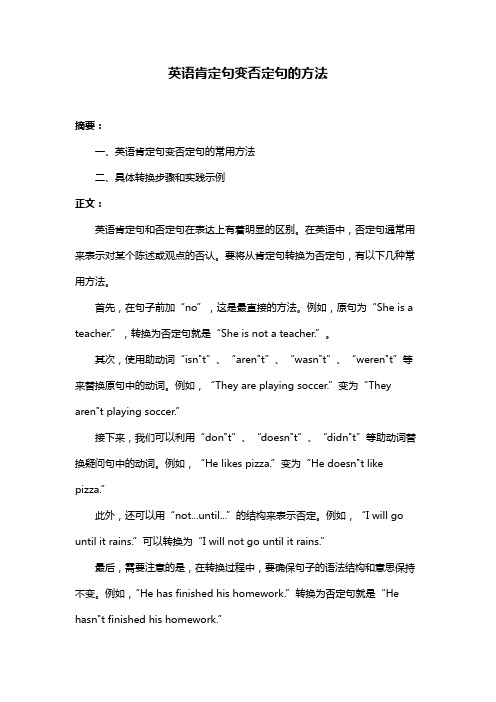
英语肯定句变否定句的方法摘要:一、英语肯定句变否定句的常用方法二、具体转换步骤和实践示例正文:英语肯定句和否定句在表达上有着明显的区别。
在英语中,否定句通常用来表示对某个陈述或观点的否认。
要将从肯定句转换为否定句,有以下几种常用方法。
首先,在句子前加“no”,这是最直接的方法。
例如,原句为“She is a teacher.”,转换为否定句就是“She is not a teacher.”。
其次,使用助动词“isn"t”、“aren"t”、“wasn"t”、“weren"t”等来替换原句中的动词。
例如,“They are playing soccer.”变为“They aren"t playing soccer.”接下来,我们可以利用“don"t”、“doesn"t”、“didn"t”等助动词替换疑问句中的动词。
例如,“He likes pizza.”变为“He doesn"t like pizza.”此外,还可以用“not...until...”的结构来表示否定。
例如,“I will go until it rains.”可以转换为“I will not go until it rains.”最后,需要注意的是,在转换过程中,要确保句子的语法结构和意思保持不变。
例如,“He has finished his homework.”转换为否定句就是“He hasn"t finished his homework.”总之,掌握以上方法,就可以轻松地将英语肯定句转换为否定句。
在实际应用中,根据不同的语境和句子结构,选择合适的方法进行转换,使句子更加丰富和生动。
肯定句变否定句英语
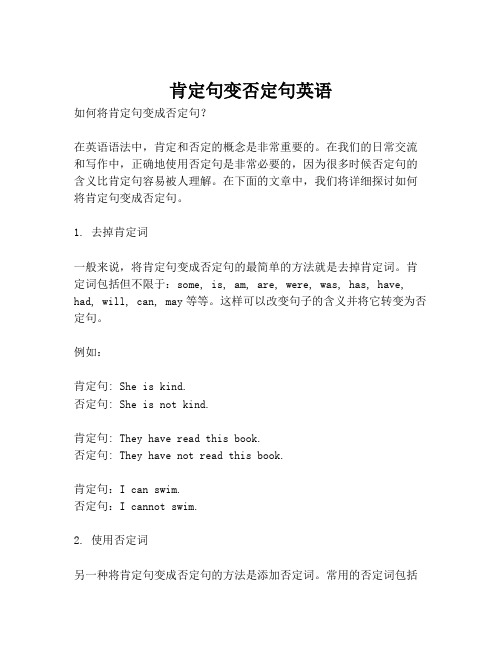
肯定句变否定句英语如何将肯定句变成否定句?在英语语法中,肯定和否定的概念是非常重要的。
在我们的日常交流和写作中,正确地使用否定句是非常必要的,因为很多时候否定句的含义比肯定句容易被人理解。
在下面的文章中,我们将详细探讨如何将肯定句变成否定句。
1. 去掉肯定词一般来说,将肯定句变成否定句的最简单的方法就是去掉肯定词。
肯定词包括但不限于:some, is, am, are, were, was, has, have, had, will, can, may等等。
这样可以改变句子的含义并将它转变为否定句。
例如:肯定句: She is kind.否定句: She is not kind.肯定句: They have read this book.否定句: They have not read this book.肯定句:I can swim.否定句:I cannot swim.2. 使用否定词另一种将肯定句变成否定句的方法是添加否定词。
常用的否定词包括但不限于:no, not, never, nothing, neither等等。
使用这些否定词能给句子带来否定的意义。
例如:肯定句: He asked me something.否定句: He didn’t ask me anything.肯定句: He always comes late.否定句: He never comes early.肯定句: I like coffee.否定句: I don’t like coffee.3. 使用相反的形容词或副词在有些情况下,我们可以使用相反的形容词或副词来将肯定句变成否定句。
例如,将“happy”换成“unhappy”,将“fast”换成“slow”等等。
例如:肯定句:She is beautiful.否定句:She is not ugly.肯定句:He is tall.否定句:He is not short.肯定句:He runs fast.否定句:He does not run slowly.总之,在英语语法中,正确使用肯定句和否定句非常重要。
肯定句变否定句的规则

肯定句变否定句的规则在英语语法中,将肯定句变成否定句的规则是非常重要的。
在实际的英语交流中,有许多时候需要使用否定句来表达自己的意图,因此掌握这个规则是至关重要的。
在英语中,将肯定句变成否定句有几种方法。
以下是几种最常用的方法:1.将be动词或动词的辅助动词not加在肯定句中。
例如:肯定句:She is happy.否定句:She is not happy.2.使用否定词,如never,not,hardly,scarcely,little 等。
例如:肯定句:I always drink coffee in the morning.否定句:I never drink coffee in the morning.3.使用两个否定词表达肯定的含义。
例如:肯定句:I have nothing to do.否定句:I don't have nothing to do.(=I have something to do.)需要注意的是,否定句中的句子结构常常会发生变化。
例如:肯定句:He speaks English well.否定句:He does not speak English well.在这个例子中,主语和动词之间插入了动词的辅助动词does。
这是因为在一般现在时和一般过去时中,要使用动词的辅助动词来表示否定意义。
此外,某些词语的否定形式也要格外留意。
例如:肯定句:I have some money.否定句:I have no money.肯定句:There is a book on the desk.否定句:There is no book on the desk.总之,在学习英语语法时,将肯定句变成否定句的规则是必不可少的一部分。
只有熟练地掌握了这些规则,才能在实际的英语交流中更自如地表达自己的意图。
英语语法之肯定句变否定句

、语语法之肯定句变否定句一、肯定句变否定句口诀给句子分析它,看它结构是哪个主加be后加not 其他一切全照抄主加动词主重要don't doesn't 来帮忙don't doesn't 中间夹doesn't doesn't 最特殊第三人称单数全靠它二、简单句的句子结构1.主语+be+其他2.主语+动词+其他备注:其中be里包括(am is are)判断下列各句是主语加be还是主语加动词1.I am a girl.2.I like singing.3.We go to school every day.4.They are good friends.5.He works hard.6.She likes playing with toys.7.My mother watches TV every day.8.You are a beautiful girl.9.Tom is playing football on the playground.10.Bill does his homework after supper.三、肯定句变否定句规则肯定句主语+be+其他变成主语+be+not+其他主语+动词+其他变成主语+don't+动词+其他主语(第三人称单数)+动词单三+其他变成主语(第三人称单数)+doesn't +动词原形+其他练习1.She is watching TV now.2.We go to school on Sunday.3.His father works hard.4.Jack's mother is a nurse.5.The cat runs fast.6.They like reading books.7.My grandpa gives me a hot dog.8.Tom often walks to school.9.I have a doll.10.It is eating fish.。
[精品]把肯定句改成否定句
![[精品]把肯定句改成否定句](https://img.taocdn.com/s3/m/0cb8e8bcaff8941ea76e58fafab069dc51224752.png)
[精品]把肯定句改成否定句一、首先,要看肯定句中是否有情态动词,如果有情态动词,直接在情态动词后面加not即可,同时句中如果有some,some就要变成any。
举例如下:1、肯定句:Mike can help you solve the problem.译文:迈克可以帮你解决那个问题。
否定句:Mike can't help you solve the problem. (can't=can not)译文:迈克不能帮你解决那个问题。
2、肯定句:You should lend some money to Mary.译文:你应该借给玛丽一些钱。
否定句:You shouldn't lend any money to Mary. (shouldn't=should not)译文:你不应该借钱给玛丽。
二、如果肯定句中没有情态动词,那就要看句中有无be动词的相应形式,如果有,直接在be动词后面加not,句中有some,some变any。
举例如下:1、肯定句:I am an English teacher.译文:我是一名英语老师。
否定句:I‘m not an English teacher.译文:我不是一名英语老师。
2、肯定句:There are some books on the desk.译文:书桌上有一些书。
否定句:There aren't any books on the desk.译文:书桌上没有书。
三、如果肯定句中既没有情态动词,也没有be动词,那么就要用相应的助动词加上not来变换,句中有some,some变any。
举例如下:1、肯定句:She likes helping others.译文:她喜欢帮助别人。
否定句:She doesn't like helping others.译文:她不喜欢帮助别人。
2、肯定句:They have some apples.译文:他们有一些苹果。
英语语法之肯定句变否定句

、语语法之肯定句变否定句一、肯定句变否定句口诀给句子分析它,看它结构是哪个主加be后加not 其他一切全照抄主加动词主重要don't doesn't 来帮忙don't doesn't 中间夹doesn't doesn't 最特殊第三人称单数全靠它二、简单句的句子结构1.主语+be+其他2.主语+动词+其他备注:其中be里包括(am is are)判断下列各句是主语加be还是主语加动词1.I am a girl.2.I like singing.3.We go to school every day.4.They are good friends.5.He works hard.6.She likes playing with toys.7.My mother watches TV every day.8.You are a beautiful girl.9.Tom is playing football on the playground.10.Bill does his homework after supper.三、肯定句变否定句规则肯定句主语+be+其他变成主语+be+not+其他主语+动词+其他变成主语+don't+动词+其他主语(第三人称单数)+动词单三+其他变成主语(第三人称单数)+doesn't +动词原形+其他练习1.She is watching TV now.2.We go to school on Sunday.3.His father works hard.4.Jack's mother is a nurse.5.The cat runs fast.6.They like reading books.7.My grandpa gives me a hot dog.8.Tom often walks to school.9.I have a doll.10.It is eating fish.。
小学英语语法:把肯定句改成否定句
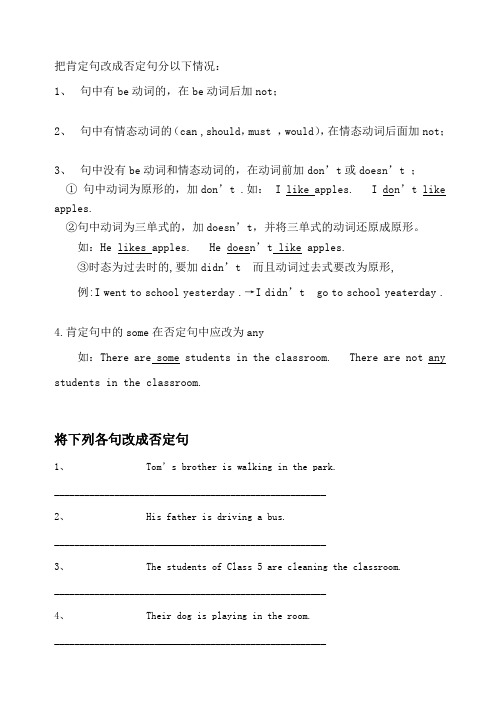
把肯定句改成否定句分以下情况:1、句中有be动词的,在be动词后加not;2、句中有情态动词的(can ,should,must ,would),在情态动词后面加not;3、句中没有be动词和情态动词的,在动词前加don’t或doesn’t ;①句中动词为原形的,加d on’t .如: I like apples. I do n’t like apples.②句中动词为三单式的,加doesn’t,并将三单式的动词还原成原形。
如:He likes apples. He does n’t like apples.③时态为过去时的,要加didn’t 而且动词过去式要改为原形,例:I went to school yesterday .→I didn’t go to school yeaterday .4.肯定句中的some在否定句中应改为any如:There are some students in the classroom. There are not any students in the classroom.将下列各句改成否定句1、Tom’s br other is walking in the park.______________________________________________________2、His father is driving a bus.______________________________________________________3、The students of Class 5 are cleaning the classroom.______________________________________________________4、Their dog is playing in the room.______________________________________________________5、Tom and Mary are friends.______________________________________________________ 6、These buses are new.______________________________________________________ 7、There are some books in the bookcase. ______________________________________________________ 8、There is a banana in the box.______________________________________________________ 9、I’m a student.______________________________________________________ 10、She is a farmer.______________________________________________________ 11、Your father can ride a bike.______________________________________________________ 12、Mr. Li can draw pictures.______________________________________________________ 13、They can play football after school.______________________________________________________ 14、I can go to Shanghai Zoo.______________________________________________________ 15、You should climb the tree.______________________________________________________ 16、We come from China.______________________________________________________17、It’s ti me for sports.______________________________________________________ 18、We like the mask.______________________________________________________ 19、He likes the violin.______________________________________________________ 20、Have some bread, Tom.______________________________________________________ 21、Please open your books.______________________________________________________ 22、I like Chinese、Maths、Art and PE.______________________________________________________ 23、Listen to the radio, please.______________________________________________________ 24、Kick the ball to me.______________________________________________________ 25、Peter, drink some juice, please.______________________________________________________ 26、Please watch TV.______________________________________________________ 27、I am a bus driver.______________________________________________________ 28、 The dog can jump.______________________________________________________29、Today is Monday.______________________________________________________ 30、They are good friends.肯定句改成否定句。
英语肯定句改否定句口诀
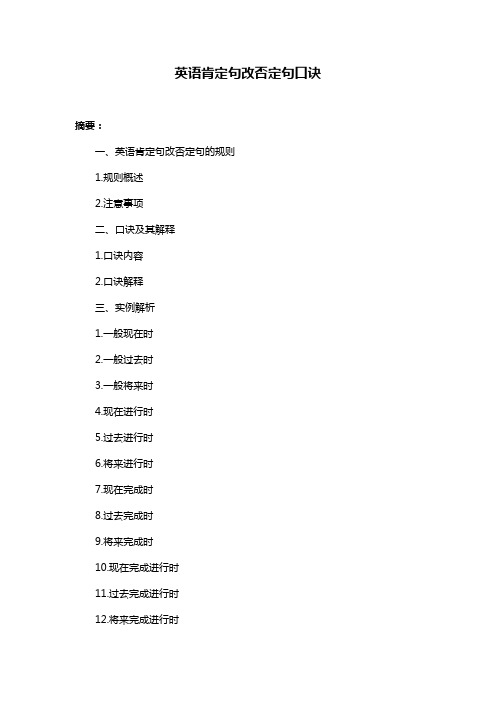
英语肯定句改否定句口诀摘要:一、英语肯定句改否定句的规则1.规则概述2.注意事项二、口诀及其解释1.口诀内容2.口诀解释三、实例解析1.一般现在时2.一般过去时3.一般将来时4.现在进行时5.过去进行时6.将来进行时7.现在完成时8.过去完成时9.将来完成时10.现在完成进行时11.过去完成进行时12.将来完成进行时正文:英语肯定句改否定句是英语语法中的一个重要环节,掌握好这个规则对于英语学习者来说非常关键。
下面,我们通过一个口诀来帮助大家更好地理解和运用这个规则。
一、英语肯定句改否定句的规则1.规则概述在英语中,将肯定句改为否定句主要遵循以下三种规则:(1)在动词前加not(2)借助助动词do, does, did(3)借助助动词have, has, had2.注意事项(1)注意保持时态的一致性(2)注意主语的一致性二、口诀及其解释1.口诀内容“没有(no)要助(do)动,有(yes)要主(have)动。
”2.口诀解释这个口诀简洁明了地概括了英语肯定句改否定句的规则。
当我们需要将一个肯定句改为否定句时,可以根据情况选择使用“没有要助动”或“有要主动”的方法。
三、实例解析以下是一些英语时态的实例,展示了如何将肯定句改为否定句:1.一般现在时肯定句:I study English every day.否定句:I do not study English every day.2.一般过去时肯定句:I studied English yesterday.否定句:I did not study English yesterday.3.一般将来时肯定句:I will study English tomorrow.否定句:I will not study English tomorrow.4.现在进行时肯定句:I am studying English now.否定句:I am not studying English now. 5.过去进行时肯定句:I was studying English then.否定句:I was not studying English then.6.将来进行时肯定句:I will be studying English then.否定句:I will not be studying English then.7.现在完成时肯定句:I have studied English.否定句:I have not studied English.8.过去完成时肯定句:I had studied English.否定句:I had not studied English.9.将来完成时肯定句:I will have studied English.否定句:I will not have studied English.10.现在完成进行时肯定句:I have been studying English.否定句:I have not been studying English.11.过去完成进行时肯定句:I had been studying English.否定句:I had not been studying English.12.将来完成进行时肯定句:I will have been studying English.否定句:I will not have been studying English.通过以上实例和口诀,相信大家对英语肯定句改否定句的规则已经有了更深入的了解。
肯定句否定句和一般疑问句的转换方法解析
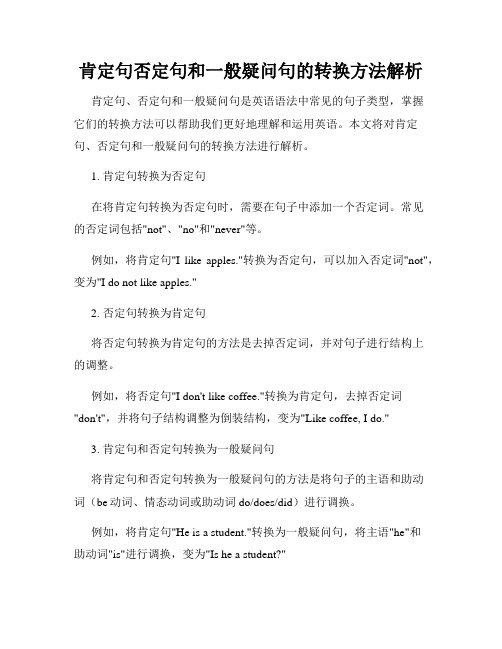
肯定句否定句和一般疑问句的转换方法解析肯定句、否定句和一般疑问句是英语语法中常见的句子类型,掌握它们的转换方法可以帮助我们更好地理解和运用英语。
本文将对肯定句、否定句和一般疑问句的转换方法进行解析。
1. 肯定句转换为否定句在将肯定句转换为否定句时,需要在句子中添加一个否定词。
常见的否定词包括"not"、"no"和"never"等。
例如,将肯定句"I like apples."转换为否定句,可以加入否定词"not",变为"I do not like apples."2. 否定句转换为肯定句将否定句转换为肯定句的方法是去掉否定词,并对句子进行结构上的调整。
例如,将否定句"I don't like coffee."转换为肯定句,去掉否定词"don't",并将句子结构调整为倒装结构,变为"Like coffee, I do."3. 肯定句和否定句转换为一般疑问句将肯定句和否定句转换为一般疑问句的方法是将句子的主语和助动词(be动词、情态动词或助动词do/does/did)进行调换。
例如,将肯定句"He is a student."转换为一般疑问句,将主语"he"和助动词"is"进行调换,变为"Is he a student?"同样地,将否定句"I don't like dogs."转换为一般疑问句,将主语"I"和助动词"don't"进行调换,变为"Do you like dogs?"4. 一般疑问句转换为肯定句和否定句将一般疑问句转换为肯定句和否定句的方法是根据问句的答案进行回答。
(完整)小学英语语法
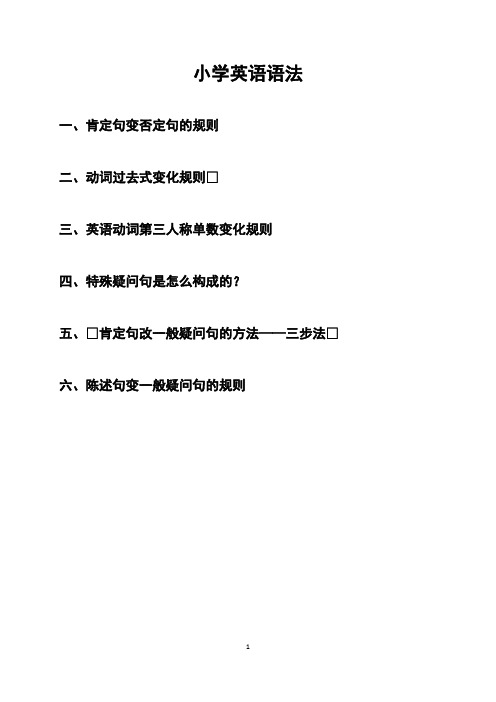
小学英语语法一、肯定句变否定句的规则二、动词过去式变化规则 三、英语动词第三人称单数变化规则四、特殊疑问句是怎么构成的?五、 肯定句改一般疑问句的方法——三步法 六、陈述句变一般疑问句的规则一、肯定句变否定句的规则 肯定句改否定句的方法 先观察句中是否有BE动词和情态动词, 1、 如果有be动词,在be动词后加not即可。
如:is not , are not , am not, was not, were not; 2、 如果有情态动词,在can,should, will等后加not。
如:cannot, should not, will not; 3、 如果上述都没有的,在动词前加助动词否定形式don’t/ doesn’t/ didn’t。
注意:肯定句改成否定句时,some 改成any。
二、动词过去式变化规则 一、规则变化 1、 一般情况下,动词词尾加-ed, 如:work—worked play—played want—wanted ask—asked talk—talked 2、 以不发音的-e结尾动词,动词词尾加-d, 如:live—lived move—moved taste—tasted 3、 以“辅音字母+y”结尾的动词,把y改成i, 加—ed, 如:study—studies try—tried copy—copied carry—carried 4、 重读闭音节动词,双写词尾辅音字母,再加—ed, 如:stop—stopped 二、不规则变化 is am—was are—were do—did have has—had go—went meet—met come—came take—took steal—stole eat—ate fly—fliew run—ran see—saw say—said make—made find—found stand—stood sit—sat sing—sang drink—drank give—gave ring—rang swim—swam write—wrote ride—rode drive—drove draw—drew grow—grew know—knew get—got forget—forgot sweep—swept keep—kept sleep—slept speak—spoke break—broke tell—told sell—sold buy—bought think—thought catch—caught teach—taught build—built can—could shall—should will—would 过去式与动词原形一样:let—let must—must put—put read—read 三、动词过去式构成读音 1、 清辅音后读清辅音[t] (清读清) 如:jump like 2、 浊辅音后读浊辅音[d] (浊读浊) 如:listen pull 3、 元音后面读浊辅音[d] (元音后面读浊音) 如:water play 4、 [t][d]后面读[id] want need三、英语动词第三人称单数变化规则 一般现在时的肯定句中,主语为第三人称单数的动词变化主要体现在词尾的变化上,其规律为: 规则 原形 第三人称单数形式 1、一般情况下,直接在动词词尾+s 如:get take play gets takes plays 2、以s, x, sh, ch, o结尾的动词,在词尾+ es guess fix finish teach go和do guesses fixes finishes teaches goes和does 3、以辅音字母+ y 结尾的动词,先把y变为i,再加es study try fly carry worry studies tries flies carries worries 4、不规则动词(特殊情况) have behas is 1、变否定句:含有动词第三人称单数形式的句子变否定句时,要在动词前面加上doesn’t 或does not,动词的第三人称单数形式要还原成原形:格式为doesn’t/does not + 动词原形,如: He goes to school at six in the morning. (变否定句) →He doesn't go to school at six in the morning. 2、变一般疑问句:把含有动词第三人称单数形式的变成一般疑问句时,要借用助动词does,如: She goes home at five every day. →Does she go home at five every day? --- Yes, she does./No, she doesn’t. 哪些主语是第三人称单数? 1、人称代词he, she, it; 如:He likes watching TV. 他喜欢看电视。
英语肯定句改为否定句口诀

英语肯定句改为否定句口诀
以下是一些常见的英语肯定句改为否定句的口诀,帮助您快速掌握。
1.一般现在时
-肯定句:主语+动词原形
-否定句:主语+do/does not+动词原形
2.一般过去时
-肯定句:主语+动词过去式
-否定句:主语+did not+动词原形
3.一般将来时
-肯定句:主语+will+动词原形
-否定句:主语+will not/won't+动词原形
4.现在进行时
-肯定句:主语+am/is/are+动词-ing形式
-否定句:主语+am/is/are not+动词-ing形式
5.现在完成时
-肯定句:主语+have/has+过去分词
-否定句:主语+have/has not+过去分词
6.过去进行时
-肯定句:主语+was/were+动词-ing形式
-否定句:主语+was/were not+动词-ing形式
7.过去完成时
-肯定句:主语+had+过去分词
-否定句:主语+had not+过去分词
8.情态动词
-肯定句:主语+情态动词+动词原形
-否定句:主语+情态动词+not+动词原形
9.be动词(一般现在时)
-肯定句:主语+am/is/are
-否定句:主语+am/is/are not
10.be动词(一般过去时)
-肯定句:主语+was/were
-否定句:主语+was/were not
这些口诀可以帮助您快速记住肯定句改为否定句的基本规则。
然而,需要注意的是,有些特殊情况下,否定形式可能会有其他变化或使用不同的词汇。
因此,在具体应用时,仍需结合具体语境和语法规则进行判断和运用。
初中英语语法系列___否定句疑问句

Yehse ,does
. Noh,e doesn’t .
9.Do they come from the U.S.A?
Yethse,y do
. No ,they don’t .
10.Is this an egg?
Yeits , is
.
No ,it
isn’t .
将划四线.对部划分线去部掉分,分提析问句. 意.
They abroexes . These arruelers.
That is an eraser.
Those eararesers.
He is a student.
They astruedents.
This is a bus.
These are bu.ses
That is a pen.
Those are .pens
1.My name is Nancy. Whaty’sour name?
2.I am from China.
Wheraere you from?
3.I am fine . Howare you?
4. Miss.Wang is our English teacher. Who is your English teacher?
3) Do Jane and Maria like China?
肯:Yes, they do. 否:No, they don’t.
4) Is this a ruler?
肯:Yes, it is . 否:No,it isn’t.
5) Is that a desk?
肯:Yes,it is. 否:No,it isΒιβλιοθήκη ’t.2.将下列句子变成单数。
1.They are pencils. It aispencil.
初一英语语法--句型转换(详细内容)

初一英语语法--句型转换(详细内容)初一英语语法—句型转换内容:陈述句:肯定句否定句疑问句:一般疑问句特殊疑问句一.肯定句变否定句1.句子中有be,在be后加not。
(be动词有am , is , are, was, were)1)I am a student. I am not a student.2)They are blue . They aren’t blue.3) He is Kangkang. He is n’t Kangkang .4) I was ten last year. I wasn't ten yesterday.5) He was good at English. He wasn't good at English.6) They were at home last Sunday. They weren't at home last Sunday.练习:把下列句子变为否定句1.His father is an English teacher._____________________________2.He is crying under the tree. ___________________________ __3.He was thirteen years old two years ago._______________________4.They are very lucky.______________________________________5.t the family was poor.6.My voice was too weak.2.谓语是动词原形,在动词前加don’t。
7.I have a book . I don’t have a book.8.They like Chinese . They don’t like Chinese.9.3) We come from China. We don’t come from China.3.谓语动词是第三人称单数,在动词前加doesn’t,动词用原形。
小学英语语法专项之肯定句变否定句

——肯“be动词”型,直接在be动词后加not,其它照抄不 变。
be动词包括:am ,is ,are ,was ,were .
I am a student. → I am not a student.
He is a boy. → He is not/isn't a boy.
7. We did morning exercises yesterday. We didn’ t do morning exercises yesterday.
8.My sister likes apples and pears.
My sister doesn’t like apples or pears.
2.The girl can sing and dance. The girl can't sing or dance.
2.I want to have an apple ,too . I don’t want to have an apple ,either .
肯定句变否定句
相关练习:
1.Mike would like some chicken.→ Mike w_o_u_l_d_n_'t like __a_n_y__ chicken.
肯定句变否定句的方法
注意缩写: is not = isn't, are not = aren't , was not = wasn't, were not = weren't, am not没有缩写, 但是I am = I'm can not = can't, would not = wouldn't
肯定句变否定句的方法
- 1、下载文档前请自行甄别文档内容的完整性,平台不提供额外的编辑、内容补充、找答案等附加服务。
- 2、"仅部分预览"的文档,不可在线预览部分如存在完整性等问题,可反馈申请退款(可完整预览的文档不适用该条件!)。
- 3、如文档侵犯您的权益,请联系客服反馈,我们会尽快为您处理(人工客服工作时间:9:00-18:30)。
英语语法之肯定句变否定句一、肯定句变否定句口诀
给句子分析它,看它结构是哪个
主加be后加not 其他一切全照抄
主加动词主重要
don't doesn't 来帮忙
don't doesn't 中间夹
doesn't doesn't 最特殊第三人称单数全靠它
二、简单句的句子结构
1.主语+be+其他
2.主语+动词+其他
备注:其中be里包括(am is are)
判断下列各句是主语加be还是主语加动词
1.I am a girl.
2.I like singing.
3.We go to school every day.
4.They are good friends.
5.He works hard.
6.She likes playing with toys.
7.My mother watches TV every day.
8.You are a beautiful girl.
9.Tom is playing football on the playground.
10.Bill does his homework after supper.
三、肯定句变否定句规则
肯定句
主语+be+其他---- 主语+be+not+其他
主语+动词原型+其他---主语+don't+动词原型+其他
主语(第三人称单数)+动词三单+其他----
主语(第三人称单数)+doesn't +动词原形+其他
练习
1.She is watching TV now.
2.We go to school on Sunday.
3.His father works hard.
4.Jack's mother is a nurse.
5.The cat runs fast.
6.They like reading books.
7.My grandpa gives me a hot dog.
8.Tom often walks to school.
9.I have a doll.
10.It is eating fish.
改为一般疑问句:
1.先找am, is, are, was, were或can,
would,放在最前面
2.如果没有am, is, are, was, were或can, would,则看动词:
1)动词是过去式,句前加Did,动词变原形,其余照抄;(2)动词是第三人称单数,句前加Does,动词变原形,其余照抄。
(3)动词是原形,则句前加Do,其余照抄。
